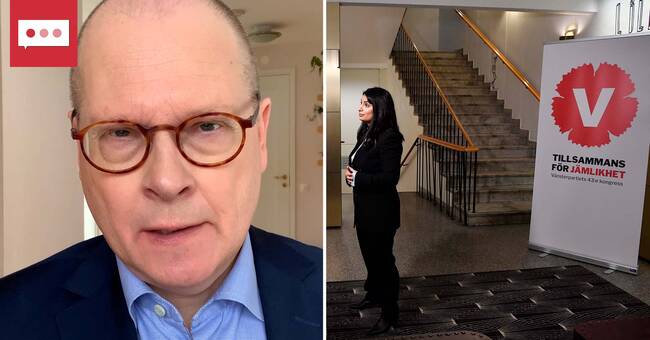When Nooshi Dadgostar was elected party leader of the Left Party in November, one of the first questions she was forced to answer was whether she was a communist.
She clearly answered no to the question and that the Left Party put communism "behind it" already when she was four years old.
With that, that thing was out of the world, both she and the rest of the party leadership probably thought.
Within the Left Party today, it is known that few issues are as devastating for the party as being linked to communism.
The Swedish working class has historically preferred to vote for reformist social democrats than revolutionary communists.
The connection between Swedish Communists and the Soviet Communists in Moscow also long damaged the party in the eyes of voters.
One who really got his party leadership career severely wounded by the issue was Lars Ohly.
He refused for a long time to stop calling himself a communist and had to pay a high price for it.
No wonder really.
Communism is an ideology that in countries where it has been implemented has gone hand in hand with oppression, dictatorship and persecution.
Therefore, it is undeniably remarkable that the Left Party's youth union, the Young Left, as recently as last month once again stated that it is "a revolutionary youth union" and that the goal is "a communist society".
Much of the thinking in the Young Left's program of principles is characterized by communist ideology and it can therefore seem quite logical that the ultimate goal is a communist society.
But for Nooshi Dadgostar, it creates problems.
Both because it once again focuses on the Left Party's communist past and because she herself has so clearly declared that she is not a communist.
In addition, Nooshi Dadgostar herself has belonged to the highest coalition leadership of the Young Left, which probably means that she too has shared the union's basic political vision of a communist society.
Therefore, new questions now arise about her statements about communism.
As early as 1917, the socialist movement split between those who believed in democracy and gradual change, and those who believed in revolution.
The Left Party's predecessor, the Swedish Communist Party, chose the revolutionary path.
In recent decades, the Left Party has increasingly distanced itself from all theories about revolution and communism, but it was only under the former party leader Jonas Sjöstedt that the party seriously succeeded in reaching a position as a broader left party, without repeated accusations of ideological legacy.
Already 20 years ago, the then party leader of the Left Party, Gudrun Schyman, in a well-publicized speech, had clearly distanced himself from communism and the revolutionary ideas.
But within the party, several representatives still continued to call themselves communists for a long time.
One of them was Lars Ohly, who when he became party leader had great difficulty explaining this.
Possibly Nooshi Dadgostar may now face similar problems.
It all depends on how well she manages to handle and parry the questions she will be faced with.
Regardless, both she and the party risk being harmed by such a discussion.

